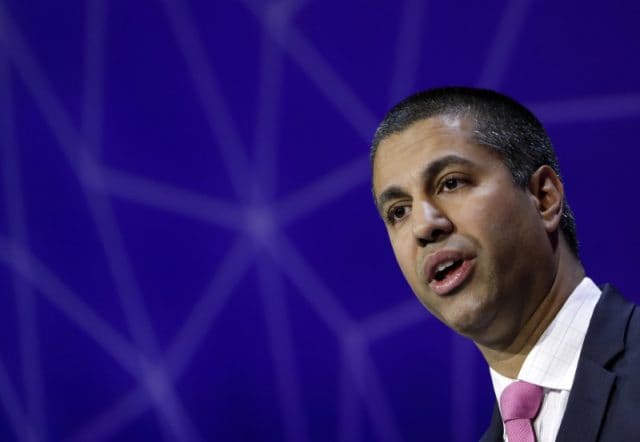
Ajit Pai, Chairman of U.S Federal Communications Commission, delivers his keynote speech at Mobile World Congress in Barcelona, Spain, February 28, 2017. REUTERS/Eric Gaillard
WASHINGTON (Reuters) – The U.S. Federal Communications Commission voted 2-1 on Thursday to reverse a 2016 decision that limits the number of television stations some broadcasters can buy.
The decision could lead to a possible acquisition by Sinclair Broadcast Group Inc of Tribune Media Co, some Democrats in Congress said.
Tribune did not discuss any tie up, but said in a statement the FCC decision “will serve the important interest of localism by enabling broadcasters to better serve their communities.”
FCC Chairman Ajit Pai said he plans to take a new look at the current overall limit on companies owning stations serving no more than 39 percent of U.S. television households.
Democratic FCC Commissioner Mignon Clyburn called the vote a “huge gift for large broadcasters with ambitious dreams of more consolidation.” She said it “will have an immediate impact on the purchase and sale of television stations.”
Her concern was echoed by the top Democrat in the U.S. House of Representatives, who a day earlier urged the Federal Communications Commission to cancel the vote.
House Democratic Leader Nancy Pelosi warned that the changes could be harmful to consumers, hitting their wallets and their access to an independent media voice, as she cited press reports of a possible acquisition by Sinclair Broadcast Group Inc of Tribune Media Co stations.
In a letter, Pelosi and Representative Frank Pallone, who is the ranking Democrat on the House Energy and Commerce Committee, urged Pai to drop the plan, which could allow the Sinclair-Tribune tie-up.
“That would be bad news for consumers in Tribune’s markets in two ways: First, consumers would lose an independent voice in their media market; and second, consumers could see their cable bills go up because Sinclair charges cable operators more than Tribune for retransmission consent,” they wrote.
Another Democrat, Representative Anna Eshoo, wrote Pai asking him to drop the plan, saying that further consolidation “will ensure there are fewer independent news outlets serving as a counter-balance to misleading or inaccurate information.”
Meredith Corp spokesman Art Slusark said on Thursday the vote “may open up the opportunity for more acquisition opportunities … We are always interested in adding quality properties to our broadcast portfolio.”
Under rules adopted in 1985, stations with weaker over-the-air signals could be partially counted against a broadcaster’s ownership cap. But last year, the FCC under Democratic President Barack Obama said those rules were outdated after the 2009 conversion to digital broadcasting, which eliminated the differences in station signal strength. It revoked the rule in September.
There is a dispute over whether the FCC has the authority to amend the 39 percent ownership limit.
The 2016 decision did not require any company to sell existing stations, but could bar acquisitions. Twenty-First Century Fox Inc in September challenged the FCC rule in court.
Reuters reported in March that Sinclair had approached Tribune to discuss a potential combination, which would hinge on regulations being relaxed.
Pai said the FCC previously effectively tightened ownership rules and then companies previously below the national cap suddenly exceeded it. He said the FCC “did not examine whether the facts justified a more stringent cap.”
Pai, who was named by U.S. President Donald Trump to head the FCC in January, said it will begin a comprehensive review of the national cap this year. That could launch a new wave of consolidation in the broadcast television industry.
Clyburn cited comments from CBS Corp Chairman and Chief Executive Leslie Moonves in February that Pai would be “very beneficial to our business.” Moonves said the company would like to acquire more stations if the cap is lifted.
(Reporting by David Shepardson; Editing by Jonathan Oatis and Dan Grebler)


 Subscribe
Subscribe
